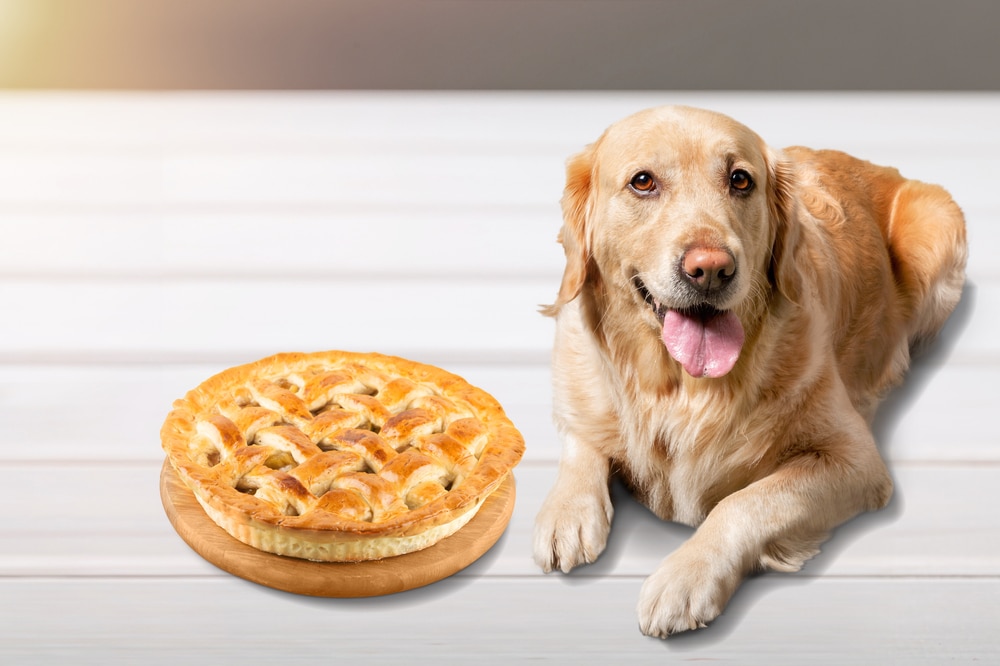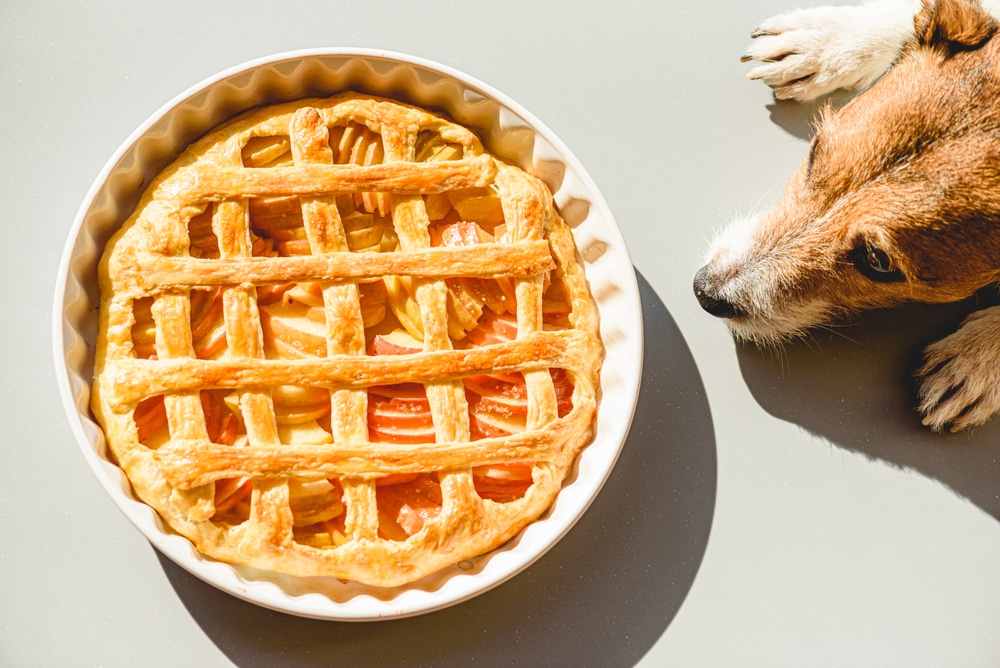When it comes to their diets, dogs have an incredibly varied appetite and can often tolerate many different types of food. However, some foods may be dangerous if fed to them. So, is it safe for dogs to eat pie?
Dogs should not eat pie. Pie crusts are often full of unhealthy fats, and pies contain sweeteners, spices, high sugar content, and flavorings that can be harmful to pups. Obesity, diabetes, heart disease, gastrointestinal problems, and pancreatitis are all potential risks associated with consuming pies as well. So, keep your pup safe, and don’t let them have any pie!
Table of Contents
Why Is Pie Bad For Dogs?
Pie poses a significant health risk to dogs due to the high sugar, fat, and other additives in most pies.
Unhealthful Fats And Oils
Pie fillings and crust are chock-full of saturated fats and oils, both of which may have an adverse effect on your dog’s digestion. In addition to potential tummy troubles or abdominal pain, too much fat in their diet can even lead to more serious issues like pancreatitis!
To make it worse, whipped cream, a common enhancement for pie, is also packed with unhealthy fat.
High Amounts Of Sugar
Pie is not the best choice for your furry companion due to its high sugar content and potential health risks. The excessive sugar in the pie can lead to weight gain, an unhealthy spike in blood glucose levels, and a skyrocketing heart rate.
Even worse, many recipes free from traditional sugars may contain xylitol, an artificial sweetener that is toxic for dog breeds!
Non-Nutritious Seasonings
Pie spice can potentially be dangerous for your dog as it contains allspice and nutmeg. Allspice is a compound of eugenols, which can damage a dog’s liver, while myristicin in nutmeg may lead to seizures, elevated blood pressure, or disorientation.
Is Pie Crust Suitable For Dogs?
Pie crust can be a pleasure for your dog in moderation. However, it is important to remember that butter or shortening contains a high amount of fat and may cause digestive issues like diarrhea and vomiting.
Excessive carbohydrates can also upset your dog’s stomach, but as long as it is given sparingly, they will be fine. Ultimately, the key here is balance!
Is Pumpkin Pie Safe For Dogs?
It is not safe to give your dog pumpkin pie as the seasoning, high sugar, and fat content can be toxic. Even a small amount of this food could cause an upset stomach in your dog, particularly for toy breeds. It’s best that you avoid feeding them such treats entirely!
Not only is the consumption of pumpkin-infused baked goods such as bread dangerous, but they are also saturated with sugar, fat, and perilous components such as nutmeg or the chemically produced sweetener xylitol.
Nutmeg: The Ingredient That Makes Pumpkin Pie Dangerous
Cautiousness is key when feeding pumpkin pie to your dog. The main danger lies in the presence of nutmeg, as this ingredient contains a compound named myristicin, which is unfortunately very toxic for dogs and other animals.
If an excessive amount is consumed by your dog, it may experience disorientation, elevated blood pressure levels, delusions, and even seizures!
Information About Specific Types Of Pies

It depends on the type of pie. Some pies contain ingredients that are safe for your pup, while others may be too toxic to give as a treat. It’s important to always double-check the ingredients of any pie you plan on giving your dog and ensure they are suitable for your dog.
Pumpkin Pie
As mentioned above, pumpkin pie can contain nutmeg, which is very toxic to dogs. Allspice is also an issue, as well as cloves. This pie also contains unhealthy ingredients such as sugar, butter, shortening, and sweetened condensed milk. Avoid giving this to your dog.
Apple Pie
Apple pie also contains nutmeg and allspice. In addition, it contains unhealthy ingredients such as sugar, butter, and shortening. Avoid giving this to your dog.
Pecan Pie
Pecan pie doesn’t contain any toxic ingredients, but it does have unhealthy ingredients such as pecans, corn syrup, butter, shortening, and extracts. Avoid giving this to your dog as well.
Cherry Pie
Cherry pie also doesn’t contain any toxic ingredients, but it does have sugar, butter, shortening, and extracts. So, you can technically give your dog small bits of cherry pie, but it’s still not recommended.
Sweet Potato Pie
Sweet potato pie contains nutmeg. It also contains sugar, butter, shortening, and extracts.
Key Lime Pie
Limes are toxic to dogs. In addition, this pie contains sugar, butter, shortening, and extracts. Avoid giving this pie to your dog.
Chicken Pot Pie
Chicken pot pie contains onion and garlic, which are toxic to dogs. In addition, it has unhealthy ingredients such as butter, shortening, salt, and spices. Avoid giving this pie to your dog.
What Hazards Lurk When Your Dog Enjoys A Slice Of Pie?
Regarding pies, the main hazards include unhealthy fats and oils, high amounts of sugar, un-nutritious seasonings, and even artificial sweeteners. These hazardous ingredients can cause many health risks, such as:
- High-fat content can cause gastrointestinal problems and even pancreatitis.
- Unhealthful fats and oils pose a risk for digestion-related issues.
- Excessive sugar levels may lead to weight gain, high blood glucose, and an increased heart rate.
- Non-nutritious seasonings such as allspice, nutmeg, and xylitol can be toxic for dogs and cause liver damage, seizures, disorientation, and elevated blood pressure.
- Pie crust ingredients high in fat or carbohydrates may cause an upset stomach in your dog if consumed in excess.
- Butter or shortening in the crust can cause an upset stomach, such as vomiting and diarrhea.
What To Do If Your Dog Eats Pie?
If your dog has eaten pie, here’s what to do:
- Check for any toxic ingredients, such as nutmeg or artificial sweeteners (xylitol) in the pie.
- Remove the remaining pieces of food from the area to prevent your dog from eating more.
- Contact the vet and describe the type of pie and any ingredients that may have been in it.
- Monitor the dog for discomfort/distress (e.g. vomiting, diarrhea, disorientation).
- Provide plenty of water and avoid giving further treats until it recovers.
Alternative To Feeding Pie To Your Dog
Skip the pie and give your pup something special. Bake up some pet-safe treats or buy a box from the store. These snacks are formulated to keep your pup healthy, delivering essential nutrients in every bite. Here are some ideas:
- Bake dog-friendly treats or buy pet-safe treats from the store.
- Make an ice cream sundae with peanut butter, coconut milk, and banana slices.
- Mix oatmeal with applesauce and other fruits for a snack.
- Create pupcakes with mashed sweet potatoes, peanut butter, and oats.
- Make frozen yogurt popsicles with low-fat plain yogurt, peanut butter, and banana slices.
- Microwave small pieces of cooked chicken or beef for a quick snack.
- Create an appetizing treat with plain yogurt, mashed blueberries, and honey.
- Soak kibble in chicken broth for a nourishing treat.
- Mix peanut butter with mashed banana, oats, and honey for a delicious snack.
- Create a savory treat with carrots, lean ground beef, and cooked brown rice.
- Offer fresh fruits and veggies as occasional snacks (e.g. carrots, apple slices).
In Conclusion: Can Dogs Eat Pie?
It’s best to avoid letting dogs eat essentially any kind of pie. Nutmeg, a common ingredient found in many pies, is highly toxic for canines. Other ingredients like pumpkin can also be dangerous, so it’s safest to keep all baked goods away from your dog. If your pooch has accidentally eaten a pie, call your vet right away and watch for any signs of illness.
So, what alternatives to pie will you give to your dog? Let us know in the comments below!
